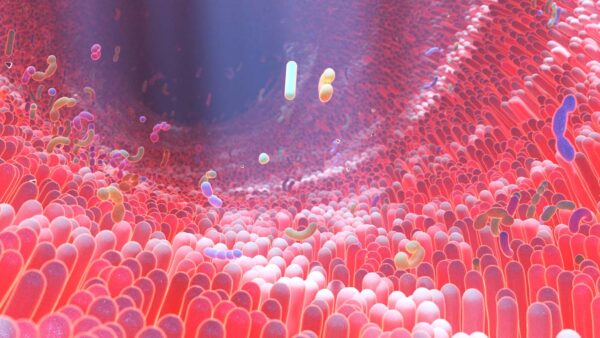
CAR-T cells, or chimeric antigen receptor T cells, hold great potential for the treatment of cancer and other diseases. Although several CAR-T therapies have received FDA approval in the US, outcomes for patients receiving these treatments are mixed. More than half of the time, patients either relapse after initial response or don’t respond to the therapy at all.1,2 That said, many that receive CAR-T cell infusions do so because all other treatment options have been exhausted. Even if fewer than half see improvement, CAR-T cell infusion still represents a last-minute miracle for those that do get better. Nevertheless, researchers and clinicians are eager for a better understanding of the factors underpinning such heterogeneous outcomes. Part of the answer may reside in the microbiome of each patient’s gut.
A binational clinical study was conducted involving American and German patients receiving CAR-T infusions for diagnoses including, “diffuse large B-cell lymphoma (DLBCL) or transformed follicular lymphoma (TFL) (n=162), primary mediastinal lymphoma (PMBCL) (n=4), Richter’s transformed chronic lymphocytic leukemia (TCLL) (n=3) and transformed marginal zone lymphoma (TMZL) (n=3).”1 The aim of the study was to explore associations between CAR-T therapy clinical outcomes and two inter-related variables: the patient’s gut microbiome and the effect of antibiotic administration. Further, the study describes approaches aimed at using those associations to predict whether the outcome of CAR-T therapy will ultimately be beneficial for a given patient.
Evidence exists indicating that changing a patient’s gut microbes can improve the way their immune system combats cancer.3 The assault upon that microbial community represented by a course of antibiotics can also have an effect, and one that should be clearly understood. Toward that goal, stool samples from the German and American cancer patients were collected from two months prior to seven months after receiving their CAR-T infusions to analyze the microbial communities present in their stool. Some patients received antibiotics in the three weeks prior to administration of CAR-T cells and changes in the microbial populations of their guts were tracked, along with the overall clinical outcomes of all the patients.
Certain antibiotics were found to be “high risk.” These included broad-spectrum antibiotics like meropenem, cefepime and tazobactam/piperacillin. Patients who either received no antibiotics or received “low risk” alternatives tended to have more positive clinical outcomes. Treatment with specific antibiotics preceded predictable declines in the prevalence of certain types of microbes. Clinical outcomes were associated with these declines and were also connected to the relative number of specific microbial populations in the gut at the time of apheresis. Apheresis is the method by which immune cells were initially collected to be transformed into CAR-T cells. Gut microbes present at apheresis were found to influence the relative proportion of CD3, CD4 and CD8 T cells in the peripheral blood being sifted through for CAR-T starting material. The relative ratios of these cells in the white blood cell population used to create CAR-T cells has been found to influence the efficacy of the therapy for the recipient.4 Thus, the gut microbiome seems to be a significant factor in determining how potent the cell therapy will ultimately be for the patient.
Armed with these data, researchers set out to create a machine learning model that might foretell the likelihood of success for a patient undergoing CAR-T immunotherapy. Settling on a deterministic statistical approach, the model developed was able to associate specific gut microbe species with clinical outcomes. Most of the microbes the model determined were indicative of a positive outcome were anaerobes vulnerable to broad-spectrum antibiotics. Much like in the microbial communities found in patients who would ultimately not respond to the cell therapy, those patients who had received “high risk,” broad-spectrum antibiotics hosted relatively few of those types of microbes.1
The term “personalized medicine” is often in medical news for good reason. As more tools are created that give physicians foreknowledge of clinical outcomes, countless patients may benefit. Society as a whole will hopefully enjoy the rewards of less medical waste too, as fewer unnecessary procedures are carried out and the right treatment for each patient delivers them back to good health faster.
References
- Stein-Thoeringer, C. K., Saini, N. Y., Zamir, E., Blumenberg, V., Schubert, M. L., Mor, U., Fante, M. A., Schmidt, S., Hayase, E., Hayase, T., Rohrbach, R., Chang, C. C., McDaniel, L., Flores, I., Gaiser, R., Edinger, M., Wolff, D., Heidenreich, M., Strati, P., Nair, R., … Elinav, E. (2023). A non-antibiotic-disrupted gut microbiome is associated with clinical responses to CD19-CAR-T cell cancer immunotherapy. Nature medicine, 29(4), 906–916. https://doi.org/10.1038/s41591-023-02234-6
- Park, J. H., Rivière, I., Gonen, M., Wang, X., Sénéchal, B., Curran, K. J., Sauter, C., Wang, Y., Santomasso, B., Mead, E., Roshal, M., Maslak, P., Davila, M., Brentjens, R. J., & Sadelain, M. (2018). Long-Term Follow-up of CD19 CAR Therapy in Acute Lymphoblastic Leukemia. The New England journal of medicine, 378(5), 449–459. https://doi.org/10.1056/NEJMoa1709919
- Davar, D., Dzutsev, A. K., McCulloch, J. A., Rodrigues, R. R., Chauvin, J. M., Morrison, R. M., Deblasio, R. N., Menna, C., Ding, Q., Pagliano, O., Zidi, B., Zhang, S., Badger, J. H., Vetizou, M., Cole, A. M., Fernandes, M. R., Prescott, S., Costa, R. G. F., Balaji, A. K., Morgun, A., … Zarour, H. M. (2021). Fecal microbiota transplant overcomes resistance to anti-PD-1 therapy in melanoma patients. Science (New York, N.Y.), 371(6529), 595–602. https://doi.org/10.1126/science.abf3363
- Shah, N. N., Highfill, S. L., Shalabi, H., Yates, B., Jin, J., Wolters, P. L., Ombrello, A., Steinberg, S. M., Martin, S., Delbrook, C., Hoffman, L., Little, L., Ponduri, A., Qin, H., Qureshi, H., Dulau-Florea, A., Salem, D., Wang, H. W., Yuan, C., Stetler-Stevenson, M., … Fry, T. J. (2020). CD4/CD8 T-Cell Selection Affects Chimeric Antigen Receptor (CAR) T-Cell Potency and Toxicity: Updated Results From a Phase I Anti-CD22 CAR T-Cell Trial. Journal of clinical oncology : official journal of the American Society of Clinical Oncology, 38(17), 1938–1950. https://doi.org/10.1200/JCO.19.03279
